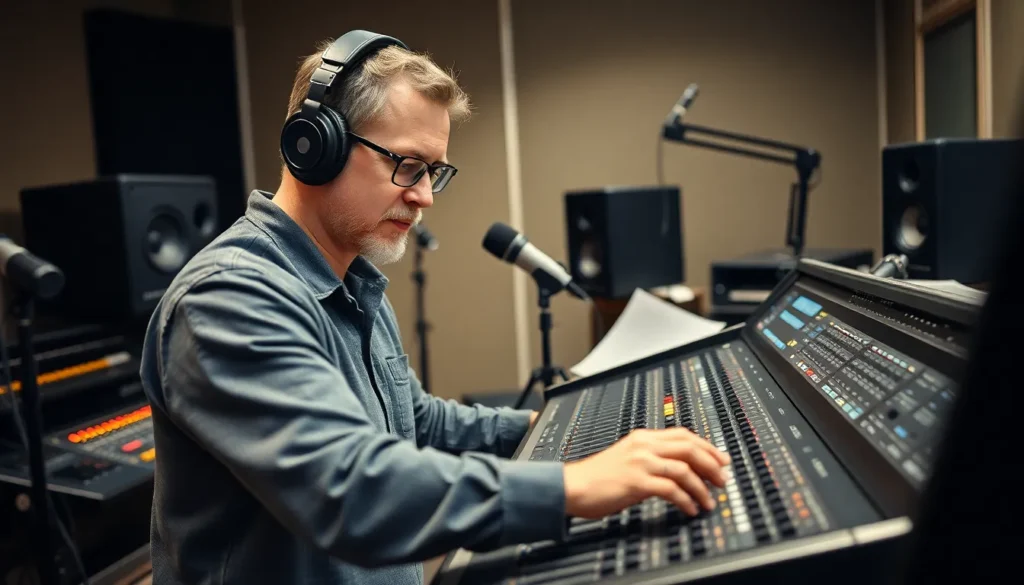Table of Contents
ToggleIn a world where silence is golden, sound technicians are the unsung heroes who ensure that every note, clap, and whisper resonates perfectly. Imagine a concert where the lead singer’s mic cuts out mid-chorus or a movie scene where the dialogue sounds like it was recorded underwater. Yikes, right? That’s where these audio wizards come in, transforming chaos into symphonic bliss.
From balancing audio levels to troubleshooting unexpected glitches, sound technicians wield their gear like modern-day sorcerers. They’re the ones who make sure that the music is always on point and the sound effects land with a bang—not a fizzle. So, whether it’s a live event, a film set, or a recording studio, these professionals work tirelessly behind the scenes to create an auditory experience that captivates audiences and keeps them coming back for more.
Overview of Sound Technicians
Sound technicians play a vital role in the entertainment industry. These professionals manage various audio elements throughout productions. They ensure sound quality during concerts, film shoots, and studio sessions. Skills in equipment operation, audio mixing, and problem-solving are essential for success.
Experience varies widely among sound technicians. Some may focus on live sound reinforcement, while others specialize in studio recording. Many technicians possess knowledge of sound design, helping them create captivating auditory experiences. A solid understanding of acoustics enhances their effectiveness in different environments.
Education and training paths also differ. Formal education, such as audio engineering degrees, provides foundational skills. Alternatively, hands-on training through internships offers real-world experience. Various certifications exist, further validating a technician’s expertise in equipment and standardized practices.
Collaboration with other professionals is crucial. Sound technicians often work alongside directors, musicians, and production staff. This teamwork ensures a cohesive vision for audio production. Effective communication helps technicians adapt to varying needs and troubleshoot issues promptly.
Industry trends impact the work of sound technicians. Advances in technology, such as digital audio workstations, shape modern practices. Familiarity with software and equipment helps technicians stay relevant. Continuous learning and adaptation to new tools enhance their capabilities.
Sound technicians contribute significantly to the overall quality of audio in various settings. Their technical skills, collaborative mindset, and ongoing education play a major role in the success of performances and productions.
Roles and Responsibilities

Sound technicians play a vital role in creating exceptional audio experiences across various platforms. Their responsibilities encompass a range of technical and collaborative tasks necessary for successful productions.
Equipment Operation
Sound technicians operate various audio equipment, including microphones, mixers, and speakers. They ensure that all devices function correctly during live events or recordings. Each piece of equipment requires specific handling and setup, so familiarity with equipment brands and models remains essential. Additionally, technicians regularly conduct maintenance checks to prevent technical issues during performances. Observing sound quality allows them to make necessary adjustments promptly. Training on new technologies, like digital audio interfaces, enhances their proficiency.
Sound Mixing Techniques
Sound technicians employ sound mixing techniques to achieve the desired audio balance. They adjust levels, equalization, and effects to enhance the listening experience. Skilled technicians utilize both analog and digital mixers, adapting their approach based on the setting. Cloud-based mixing software often streamlines collaboration during virtual sessions. The application of layering and panning techniques creates depth within the sound. Technicians refine mixes through careful listening and feedback from collaborators, ensuring the final product meets artistic expectations.
Collaboration with Other Professionals
Collaboration remains critical for sound technicians, as they frequently engage with directors, musicians, and production staff. Effective communication aids in understanding the creative vision and adjusting audio elements accordingly. Technicians share insights on sound requirements and offer solutions to challenges that arise during production. Participation in pre-production meetings establishes a clear roadmap for audio expectations. Relationships with artists allow technicians to grasp their preferences, which enhances overall performance quality. Trust and cooperation between technicians and other team members foster a harmonious production environment.
Required Skills and Qualifications
Sound technicians must possess a blend of technical and soft skills to excel in their roles. Both sets of skills ensure they effectively manage audio elements and collaborate within diverse teams.
Technical Skills
Technical proficiency stands as a cornerstone for sound technicians. Knowledge of audio equipment like microphones, mixers, and speakers proves essential. Familiarity with software such as digital audio workstations enhances their capability to produce high-quality sound. Understanding sound mixing techniques, including equalization and effects manipulation, significantly improves audio output. The ability to troubleshoot equipment issues quickly ensures smooth performances. Staying current with industry trends and technological advancements enables sound technicians to adapt and utilize new tools effectively, boosting overall productivity.
Soft Skills
Soft skills complement a sound technician’s technical abilities. Communication skills facilitate clear dialogue with directors, musicians, and production staff. Adaptability allows technicians to adjust to changing environments and unforeseen challenges. Critical thinking empowers them to make quick decisions during live events. Strong collaborative abilities foster teamwork, establishing trust among production team members. Leadership skills help guide less experienced technicians and coordinate efforts during complex setups. Providing solutions and managing stress effectively under tight deadlines ensures a seamless workflow, contributing to successful audio experiences.
Career Opportunities
Sound technicians encounter diverse career opportunities across multiple industries. The entertainment sector is a primary employer, encompassing live music events, theater productions, and film sets. Corporate settings also require these professionals for conferences, training videos, and presentations. Education institutions, ranging from schools to universities, often hire sound technicians to manage audio needs for performances and broadcast events.
Industries Hiring Sound Technicians
Industries actively seeking sound technicians include film production, broadcasting, and live event management. The gaming industry has emerged as a significant employer, demanding skilled technicians for spatial audio design and sound effects. With the rise of online content creation, digital platforms and streaming services also require audio professionals to ensure high-quality sound. Non-profit organizations and community centers often recruit technicians for events, further expanding the job landscape.
Job Growth Potential
Job growth for sound technicians remains robust, driven by technological advancements and the increasing demand for high-quality audio experiences. The U.S. Bureau of Labor Statistics projects a 9% growth rate for audio and video technicians from 2021 to 2031. This demand reflects the need for audio professionals in various settings, including virtual reality and augmented reality applications. Technical positions are becoming more prevalent in both traditional and emerging media, showcasing the expanding opportunities available in this field.
Sound technicians are indispensable in creating memorable audio experiences across various platforms. Their expertise not only enhances the quality of sound but also elevates the overall impact of performances and productions. As the demand for skilled audio professionals continues to rise, those who stay current with technology and industry trends will find abundant opportunities.
By mastering both technical and interpersonal skills, sound technicians can ensure seamless collaboration with other creatives. Their commitment to excellence and adaptability in a fast-paced environment solidifies their role as essential contributors to the entertainment landscape.







